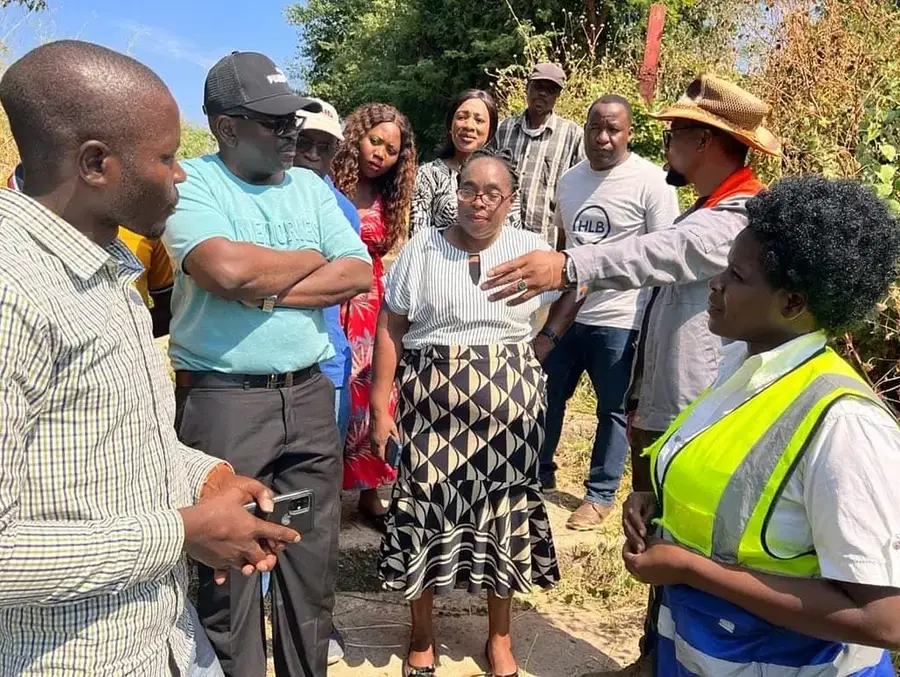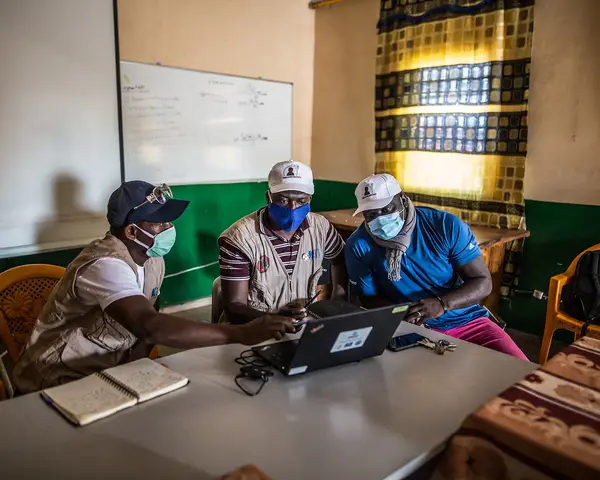
Credit: USAID Expanding WASH
This blog is the second in our series focused on Locally Led MERLA (Monitoring, Evaluation, Research, Learning and Adapting). See more on this series and related content at the end of this article.
RTI is committed to continuing and enhancing our work to foster locally led solutions to development challenges. That’s because we know that the most equitable, effective, and sustainable solutions are created with and championed by those who have the most in-depth understanding of how to improve lives and livelihoods in their own communities.
As part of our ongoing efforts to shift power to local actors and ensure that we are co-creating smart, shared solutions for long-term impact, we facilitate locally led MERLA, in which local partners are at the helm in creating solutions for their communities.
We recently sat down with Joseph Mumba, the Monitoring, Evaluation, and Learning (MEL) Director on the USAID Expanding Water and Sanitation Project (USAID Expanding WASH) in Zambia, to learn more about how this project is prioritizing local voices in MERLA.
What is USAID Expanding WASH?
The USAID Expanding WASH project supports the professionalization of water and sanitation services in Zambia through establishing market-based service delivery models, enhancing social accountability, and enhancing private sector participation in WASH services delivery. This project works with private sector partners, commercial utility companies, civil society organizations, and government ministries to address the policy framework around WASH and create an enabling environment for businesses to meet service demands for a larger population of the country.
As the MEL Director for the project, Joseph Mumba is facilitating a locally integrated MERLA approach to ensure that the project uses contextualized data and feedback and takes time to evaluate and learn from impacts.
INTERVIEW WITH JOSEPH MUMBA
How does USAID Expanding WASH integrate a locally led MERLA approach in its work?
We used a participatory approach to design the project’s MERLA work by sharing the design and theory of change with local authorities, commercial utilities, and stakeholders to get their feedback. In the first six months of the project, along with local consultants, we conducted several assessments to understand the project context, working closely with commercial utilities, local authorities, and the Ministry of Water Development and Sanitation (MWDS) in collecting information on their priorities. We then worked with local government partners to understand and validate the results of the assessments and integrated that information into the project’s theory of change.
One of the identified priorities was to support the government to strengthen its WASH information management system. The existing government WASH information management system was not adequately capturing data that would provide accurate figures on water and sanitation coverage and subsequently inform decisions on where resources should be invested. The project has been supporting MWDS to redesign the system so that it can collect data to meet the government’s information needs regarding coverage and access to (e.g., how many people have access to safely managed water and sanitation services and how service varies by different areas).
We have also worked in a participatory process with the MWDS, local government counterparts, community leaders, and NGOs to develop the revised system (IT infrastructure) so that it can be used by the government and its partners beyond the life of the project. To do this, the project provided technical assistance to the MWDS in aligning the data elements they are collecting to the WHO and UNICEF’s Joint Monitoring Programme (JMP) standard WASH indicator definitions, and enhancing the skills of their staff to collect, manage, and share the data.
What results have you noticed after using a locally led MERLA approach?
Through the participatory approach to developing the WASH information management system, we had an opportunity to collectively build a sustainable system by establishing it on the ideas and needs of the people using it. We have noticed a sense of ownership in the process. Mr. George Mwenda, the Senior Monitoring and Evaluation Officer in the MWDS said that “locally led MERLA has helped to build consensus among the key WASH sector players on the critical standard data elements needed for decision making and provides a common framework for monitoring WASH services delivery.”
In addition, local partners participate in evidence generation and see the results of their work. With locally generated evidence, local partners are better equipped to interpret why things are or are not working, so it is easier to identify inefficiencies in our work and implement adaptations and push for policy change.
Using a locally led MERLA approach embeds learning at the heart of implementation and helps government and its partners to collectively learn from what is working and what is not working in their approaches to WASH services delivery. It has enabled a paradigm shift for how water and sanitation services are promoted in Zambia.
How can practitioners support and advocate for locally led MERLA?
Practitioners can support and advocate for locally led MERLA by demonstrating the value derived from the process. Once local partners see the value of their contributions and effect on the project’s design, then they are more supportive and prouder of the end result. Compared to externally initiated approaches, locally led MERLA approaches can be less costly, more efficient, and sustainably address challenges and social issues because they take changes in the local context into consideration from the initial program design phase. Locally led MERLA encourages ownership of the lessons generated from monitoring and evaluation data and helps reinforce confidence in the evidence for or against a particular approach to addressing WASH related challenges.
Learn more about RTI’s MERLA work.

Read the Series
Various efforts and initiatives to advance locally led international development have come and gone over recent decades. Despite their differing nomenclature, all have espoused the importance of development being owned and implemented by those closest to the challenges that the international development efforts aim to address.

